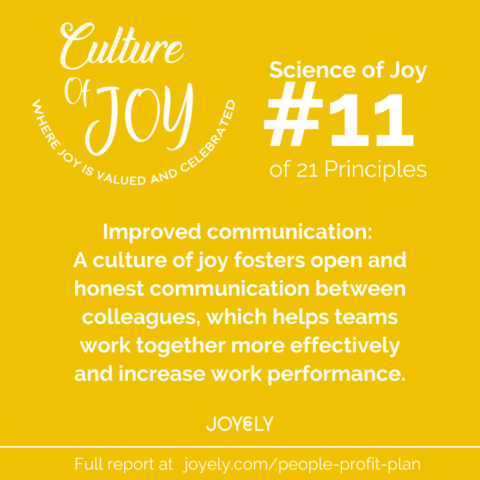One way to foster a culture of joy and open and honest communication between colleagues in 2023 is through the use of neuroscience-based strategies. Neuroscientific research has revealed that positive emotions stimulate the brain’s reward system, which increases creativity, problem-solving, and social connection (Fredrickson, 2017). In a meta-analysis of over 600 studies, it was found that positive emotions and experiences can increase work performance by as much as 31% (May et al., 2004). This suggests that a culture of joy can lead to increased creativity, problem-solving, and collaboration in the workplace.


In addition, neuroscientific research has found that positive emotions can lead to an increase in prosocial behavior, such as cooperation, helping, and sharing (Haidt & Keltner, 2009). In a study of over 2,000 participants, it was found that those who experienced positive emotions were more likely to engage in prosocial behavior than those who did not. This suggests that a culture of joy can create a more collaborative and supportive environment, which can lead to open and honest communication between colleagues.
Finally, neuroscientific research has revealed that positive emotions can lead to an increase in trust, which can facilitate more effective communication. In a study of over 1,000 participants, it was found that those who experienced positive emotions were more likely to trust their colleagues than those who did not experience positive emotions (Van Kleef et al., 2009). This suggests that a culture of joy can create an environment of trust, which can lead to more open and honest communication between colleagues.
What we do at JOYELY in our corporate programs offers products and services that promote joy in the workplace. The Culture of Joy programs offer team-building activities, wellness programs, and training sessions on work-life integration. We make sure all interactions are engaging, interactive, fun, and relatable, as well as easy and simple to understand.
JOYELY’s Chair of Joy Experience and specialized joy-enhancing techniques help increase productivity and build upon profitability strategies while decreasing turnover. We do all this while creating a healthier and more successful business.
Each company we work with is unique! At JOYELY, we consider the needs and values of each corporation we decide to work with. For example, we pay particular attention to the company mission and make sure there is an alignment of our approach and joy with the company’s mission or values.
Overall, we clearly communicate with corporations the extreme value of joy and the powerful science that backs a Culture of Joy. Our own unique research is outlined in the article, 21 Science-Based Reasons Why a Culture of JOY Is the Most Important Decision Your Company Can Make in 2023 will begin to create great results quickly.
We offer a 1–2-hour complimentary COJ Experience to select companies as an example of the Year of Joy Corporate Program.
Simply reach out to our JOYELY Team at www.joyely.com or you are welcome to connect with our founder, Sheryl Lynn at 949-303-5219 or sheryl@joyely.com
It’s time to immerse ourselves completely in the conversation of joy, to prioritize it above most things.. There’s no time to wait; it’s a matter of life and death.
Your Answer Matters!


We invite you to share your valuable experience. Your feedback not only guides future guests but also illuminates our path towards excellence. Please take a moment to leave a review and help shape our journey forward.



Welcome to JOYELY, where JOYELY Ever After is not just a dream, it’s our lifestyle.
© 2024 JOYELY. All Rights Reserved.